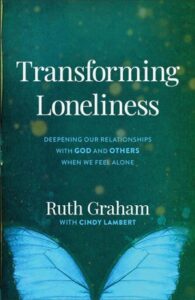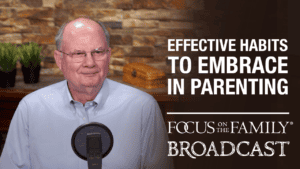Ruth Graham: Jesus also had to get away from the crowds, and he would slip away and pray all night because he needed his father’s encouragement, he needed to talk to his father. And that’s so important for us to send the crowds away. It would be our busy schedules, our activities, our thoughts. Send them away and just get with God. And that’s what we lack so desperately in our culture today.
End of Preview
John Fuller: That’s Ruth Bell Graham explaining how loneliness or solitude can actually be a good thing for us. And we’re looking forward to hearing more of her insights today on Focus on the Family with Jim Daly. Thanks for joining us. I’m John Fuller.
Jim Daly: It’s incredible that we live in the most technologically connected age in human history, and yet many of us feel alone. Uh, we don’t like feeling that way. We don’t even want to admit it when we feel lonely. But research is clear as we shared, uh, last time with Ruth, nearly half of adults in the US report feeling lonely and younger generations especially feel like they have no friends, and that is tragic. And it reflects the truth found in Genesis 2 where it says, “It is not good that man should be alone.” Uh, God created us to be part of a meaningful community, in our families, uh, with our friends, and most importantly, in the church. And as we shared last time, Ruth had some great insights on this topic. Like her REACH acronym-
John: Hmm.
Jim: … where you need to be intentional about reaching out to others and to God when you experience loneliness, and learn to trust God to help you connect and serve other people.
John: Mm-hmm. And yesterday, Jim, what I appreciated was Ruth, uh, reminding us that even Jesus got away. Uh, he was so surrounded by activity and demands, but he got away to get time with God, which is a good habit for us to emulate as well.
Jim: I agree 100%. And, uh, the program we shared last time was great and I’m looking forward to sharing part two today. If you missed last time, contact us to get the download or look for the previous episode on YouTube, or get the Focus on the Family app so you can listen anytime you like.
John: Uh, we’re returning back to a conversation that Jim had with Ruth at her home in Virginia, and, uh, what forms the foundation for the discussion is a book that Ruth wrote called Transforming Loneliness: Deepening Relationships with God and Others When We Feel Alone. And we’ve got details about the book and our guests at focusonthefamily.com/broadcast. And here’s part two of the conversation with Ruth Graham on today’s Focus on the Family with Jim Daly.
Jim: It’s a heavy topic, loneliness-
Ruth: Hmm.
Jim: … and yet you’ve chosen to write about it, Transforming Loneliness, out of your experience, your life.
Ruth: Mm-hmm.
Jim: And, uh, for the listeners that weren’t with us last time, that recap of the motivation to write a book on loneliness, what, what prompted you to do this?
Ruth: Well, it was a time of, uh, in the hospital when, uh, I was by myself and I couldn’t move. I had to lay on my back for days at a time and they had to redo a surgery. And, um, again, have to lay on my back. My girls and family were far away, and I was just by myself. I couldn’t turn over. I couldn’t reach the glass of water. I couldn’t pull the covers up over my head. Um, so I was profoundly lonely. Now I knew Jesus was there, but I wanted somebody bring me that cup of water, (laughs) you know?
Jim: Yeah.
Ruth: Um, so that was the seed I think for the book.
Jim: You know, Ruth, I’m thinking of a person who might say Jesus is enough.
Ruth: Mm-hmm.
Jim: He’s sufficient-
Ruth: Mm-hmm.
Jim: … and kind of look down upon somebody who feels lonely-
Ruth: Mm-hmm.
Jim: … in this life, but that’s not what God intends for us.
Ruth: No.
Jim: It’s not a righteous thing to be-
Ruth: No. And I don’t think it’s real.
Jim: Yeah.
Ruth: You know, when somebody says, you know, Jesus is enough. Yeah. But we, we want Jesus with skin on. We want-
Jim: Yeah.
Ruth: … um, we want, um, not you don’t want something more ’cause He is everything, but still we need human connection. We need to be in community. We need to have somebody around us.
Jim: I hadn’t thought about this, but that individual that has that kind of religious attitude may also be a person that doesn’t really need a lot of people around them.
Ruth: Mm-hmm.
Jim: Right? (laughs) Doesn’t that sound like the stereotype?
Ruth: But they maybe the loneliest people in the world.
Jim: But they’re probably the loneliest-
Ruth: Mm-hmm.
Jim: … people in the world. That’s so well said. Um, in your book, Transforming Loneliness, you identify several bible stories that illustrate, you know, the important lessons about loneliness. It’s, uh, it’s kinda interesting to go with a theme like that through the scripture-
Ruth: Mm-hmm. Mm-hmm.
Jim: … and identify that. So when you put the magnifying-
Ruth: Mm-hmm.
Jim: … glass up to scripture-
Ruth: Mm-hmm.
Jim: … and look for loneliness, what did you find?
Ruth: I found lots of people who experienced real loneliness, uh, and faced it with, um, courage and bravery and, well, uh, work through it and used it in their lives.
Jim: Let me hear some examples.
Ruth: Uh, well, look at David. Uh, and we, we need to differentiate there’s loneliness and solitude and isolation. And loneliness is transient, it’ll go away. If it becomes chronic, then it leads to all sorts of things like depression and illness. But, um, then you have solitude, which is what we choose. We choose to get rid of the noise so we can hear God. We choose to recalibrate when we’re in solitude. And then you have isolation, which the Bible says, “He who separates himself is not wise.” So, um, and isolation is, or is one of the hardest punishments we meet out these days in prisons.
Jim: Yeah. Like planned loneliness.
Ruth: Yes. Yes.
Jim: Like we separate you, we put you in lockdown-
Ruth: Mm-hmm.
Jim: … we separate you from humanity.
Ruth: Yeah. And some of prisoners, I have a ministry to prisoners, and they, they contributed to this book.
Jim: Ah.
Ruth: So I was grateful for their insights. But, um, David was, chose solitude. He was in, in the desert Wilderness tending his father’s sheep-
Jim: As a boy.
Ruth: … as a boy, and he used that time to practice his slingshot-
Jim: (laughs)
Ruth: … over and over and over again, and he was prepared to kill a giant.
Jim: Right.
Ruth: And he practices his, uh, harp, and his songs, and he was qualified to become the King’s harpist. And, uh, so David used that time. He didn’t waste it. Uh, but I’m sure there were lonely moments, but, and you can see that in the Psalms where, when he’s writing. You see his loneliness, you see his heart cry, but you also see his joy in the Lord and the, the, um, expressions of worship.
Jim: Yeah. It’s, it’s amazing and he is a good example of that ’cause he was also overlooked.
Ruth: Mm-hmm. Yes.
Jim: Right?
Ruth: By his family.
Jim: By his family.
Ruth: (laughs)
Jim: Like is there any other brother in the, in the family?
Ruth: Mm-hmm.
Jim: Uh, a younger brother-
Ruth: Mm-hmm.
Jim: … but he’s out in the field-
Ruth: Mm-hmm. Mm-hmm.
Jim: … and he ended up being the one.
Ruth: That’s right.
Jim: So it’s amazing. You also point to Daniel.
Ruth: Yes.
Jim: How, how was Daniel lonely?
Ruth: Daniel was high up in the kingdom. He was one of the leaders, and the king decided that he decreed that everybody had to, uh, when the horns, trumpets blared, everybody had to bow down and worship this statue. And Daniel wouldn’t do it. And he said nobody could pray except to him, and Daniel wouldn’t do it. And Daniel instead of-
Jim: Hmm.
Ruth: … hiding his religion or his faith, he went and prayed in the window so people could see him.
Jim: (laughs)
Ruth: And-
Jim: I never thought about it that way, but, yeah.
Ruth: And Daniel was thrown in the lion’s den. I mean, and I’m sure it wasn’t a pleasant experience to be thrown… they probably dragged him and beat him up on the way and threw him to this lion. And you talk about being alone, except with the lion. And then an angel of the Lord appears and shuts the life, uh, mouth of the lion. And when we are lonely, God does send something to us.
Jim: Hmm.
Ruth: Um, maybe not an angel, but maybe a person, maybe a thought, maybe a book, maybe a certain phrase that somebody uses that helps us. He doesn’t leave us. He uses every method he can to help us.
Jim: Yeah. Um, you, you also had the observation that Abraham even though he was heartbroken over God’s command to sacrifice Isaac, and this is another interesting twist on loneliness when God gives you an assignment that puts you out on the limb.
Ruth: Well, I can’t imagine what Abraham must have been feeling, uh, as he trudged up Mount Moriah. Um, he couldn’t talk to anybody, but certainly couldn’t talk to Sarah about it.
Jim: Put that, that in context for the listeners-
Ruth: Oh, well-
Jim: … that may not know the story.
Ruth: … well, Abraham was, had his only son that God had promised. This was the promise that God had given him that he would have a child, even though that he was too old to have one, but this baby had arrived and this was the child. And God said, “I want you to sacrifice your son, your only son.” And so Abraham being faithful as he was, he took his son, who’s by that time a teenager, uh, up Mount Moriah, carrying the wood, carrying the flame-
Jim: Hmm.
Ruth: … and Abraham couldn’t say anything to Sarah. He can’t say, “Oh, I’m taking Isaac out to the wilderness to sacrifice him.” He couldn’t talk to Isaac. He couldn’t talk to the Lord out loud. So you wonder this loneliness, heavy loneliness of this, and yet at the same time, I have a feeling, it, the Bible says that he knew that God could raise people from the dead. And so I have a feeling, maybe Abraham danced up Mount Moriah because he was so excited to see what God was going to do.
Jim: Huh.
Ruth: Was God going to raise this boy from the death or was he gonna spare him in some other way? So I think David, um, Abraham was very excited.
Jim: I never thought about it that way.
Ruth: (laughs)
Jim: That’s different.
Ruth: And I just think, um, worship is such an antidote to loneliness.
Jim: Hmm.
Ruth: Service is an antidote. Serve on other people. But I know in my own life, one Christmas, um, the children were small, we were living in Texas and, um, my husband declared to me that he was going to go hunting on Christmas day.
Jim: Hmm.
Ruth: Christmas afternoon and the rest of the week. And I begged him not to. And he said, “No.” He was gonna go. And after all of… We had a nice Christmas morning. I had cooked and cleaned and wrapped and done, shopped, then everything I could to make it a happy time for the children. But I was… my heart was heavy that I was, we were being left. So he packed up his gear and got in his truck and off he went. And I thought, “Now what do I do?” And I don’t think the children sense that I was so angry but I was. And I thought, “What am I going to do this, uh, rest of this day?” Well, the kids were playing and I thought, “Well, I can pick up the house. I can wash the dishes.” And finally the kids went to bed and I thought, “Now I have the whole evening, what do I do?” And so I thought, “Well, I got some nice presents for Christmas, so I’m gonna write my thank, thank you notes.” So I write down, wrote all my thank you notes, now that I got that, that, that job-
Jim: (laughs) Right.
Ruth: … out of the way. And-
Jim: Like you were super-efficient-
Ruth: (laughs) Exactly.
Jim: … on the day you wanted to be not so efficient.
Ruth: Exactly. And then I thought, “Well, now what do I do?” Well, we had a piano in the living room and I don’t play the piano at all, but I can plunk out some things. And I just plunked out the, the Christmas carol, “Thou didst leave their home in a kingless, in the kingly home when he cames to Earth for me.” And I just worshipped the Lord.
Jim: Hmm.
Ruth: And Jim, if you were to ask me today what was my happiest Christmas me- memory, that would be it.
Jim: Wow.
Ruth: Mm-hmm.
Jim: So the worst day-
Ruth: Yeah.
Jim: … turned into one of the better days.
Ruth: Yeah. Exactly.
Jim: That can happen, right?
Ruth: Yeah. Absolutely.
Jim: Um, in Transforming Loneliness, you identify some dangerous responses to loneliness. Uh, what would be some of those dangerous responses?
Ruth: Well, self-medicating. Um-
Jim: So drugs or alcohol?
Ruth: Drugs, uh, or not living by your standards.
Jim: Hmm.
Ruth: Lowering, lowering your standards. Um, if you’re lonely-
Jim: Interesting.
Ruth: … and you wanna go with the crowd that’s sort of the in-crowd kind of thing.
Jim: Oh, so you’ll give up-
Ruth: Ah-huh.
Jim: … your standards-
Ruth: Mm-hmm.
Jim: … to be with people.
Ruth: Mm-hmm. And, um, and I think-
Jim: Huh.
Ruth: … it’s just really… people are reaching out for anything to say it’s, uh, it’s like when people are heartbroken or whatever, and they reach for anything to give them comfort, and they grab at the wrong things.
Jim: Yeah.
Ruth: Loneliness, uh, all of us experience loneliness, all of us. And I think of the widows. Um, years after, you know, years of marriage and now they’re left alone and they are lonely and I spoke to a retirement home not too long ago about this. And I mean they couldn’t gobble up the, the, uh, material quick enough.
Jim: Yeah. I mean that’s so amazing. Another one of those, uh, dangerous responses you point out in the book is an inward-
Ruth: Hmm.
Jim: … focus. And I think it related to, uh, your first hus- husband’s infidelity-
Ruth: Mm-hmm. Mm-hmm.
Jim: … and, but speak to that danger of turning the focus inward. what, what did you mean by that?
Ruth: Well, uh, I’ll use my illustration from my marriage. Um, and that I knew of his infidelity but I didn’t want anybody to know. Uh, I was embarrassed. I was hurt. And so I didn’t tell anybody. And at one point it got so bad that after church service I went home looking for razor blades. And-
Jim: Oh.
Ruth: … I went through my, my drawers. I didn’t have any. Went through my husband’s drawers, he didn’t have any. He used an electric razor. And during that time the Lord spoke to me, not literally, but I heard his impression on me was, “You have three kids. They’re depending on you.” And that sort of woke me out of my stuper. And I called somebody and said, “I need help.” And that person so wisely said, “Ruth, you’re not crazy.” And that was like a burden.
Jim: Wow.
Ruth: Mm-hmm. Mm-hmm.
Jim: That’s heavy. I mean that’s, uh, that’s, uh, probably the bottom of loneliness, right?
Ruth: Mm-hmm. Mm-hmm.
Jim: Is a, a suicidal ideation-
Ruth: Mm-hmm.
Jim: … that it’s better to not live-
Ruth: Yeah.
Jim: … than to live in this loneliness-
Ruth: Mm-hmm.
Jim: … or this isolation. How, how did the Lord get you out of that? Just the comment from the friend or was there more to it?
Ruth: Well, there was comment from a friend but then I, of course, went through counseling.
Jim: Yeah.
Ruth: You know, I, I had to have support around me. And then I began to tell people. I, I realized that there’s was no shame in what had happened, because I wasn’t the guilty party.
Jim: That’s anguish.
Ruth: Yes. It was. But my, you know, my community came around me and loved me and that made a difference.
John: Hmm. This is Focus on the Family with Jim Daly. And if you know someone who’s experiencing suicidal thoughts, please get help right away. And then let me mention our counseling team here at Focus. They’re caring Christians and it’d be a privilege for them to give you a call back for a free phone consultation. Our number is 800-232-6459, 800, the letter A and the word FAMILY, or click on the get help tab at focusonthefamily.com/broadcast. And now here’s the conclusion of the conversation with Ruth Graham on today’s episode of Focus on the Family with Jim Daly.
Jim: Ruth, again, for people that may not have heard. I mean you are the daughter of Billy Graham.
Ruth: Yes.
Jim: (laughs)
Ruth: Yes. I am. (laughs)
Jim: So, you know, so often they’ll look at him, I’m sure, and look at everything that he accomplished and say, “He must have the perfect family.”
Ruth: (laughs)
Jim: But, I, uh,-
Ruth: Very dysfunctional one, actually.
Jim: Yeah. But I, and I so appreciate last time the way you express your love and your admiration for him-
Ruth: Mm-hmm. Mm-hmm.
Jim: … and, but there’s nothing perfect in this world.
Ruth: No.
Jim: We’re not perfect, our families aren’t perfect.
Ruth: No.
Jim: I always like to say, you know, my dad was an alcoholic and-
Ruth: Hmm.
Jim: … my mom and my dad divorced when I was five, and I always say, “I was from your normal dysfunctional family.” (laughs) Right?
Ruth: (laughs)
Jim: Because there’s always dysfunction. It may not be those kinds of dysfunctions, but people have to be amazed that you went through all of this. We talked last time about your divorces and-
Ruth: Mm-hmm.
Jim: … and yet you are like the daughter of one of… Well, I’ll just say the leading evangelical in America ever.
Ruth: Well, look at Adam.
Jim: (laughs)
Ruth: (laughs) He was God’s son-
Jim: Let’s go there.
Ruth: … and he was in the Eden-
Jim: Yeah.
Ruth: … and yet he, he blew it. And, uh, that was a dysfunctional family.
Jim: What lesson do you, all of you, if you can speak for the siblings-
Ruth: I don’t really-
Jim: … your brothers and sisters-
Ruth: … speak for my siblings.
Jim: … the, the lessons of that? Um, how do you process that? That-
Ruth: It’s taken me a long time to process it. I mean I’m in my 70s. And, um, I’m still processing some of it. I think my siblings reacted differently.
Jim: Mm-hmm.
Ruth: Um, but I have been through a lot of counseling and grateful for it. Um, my siblings have not. Um, and I think they’re, um, cheating themselves. But they are busy. They’re-
Jim: Oh, and, and God’s got a path for every one of us-
Ruth: Absolutely.
Jim: … so-
Ruth: Absolute.
Jim: … you know, I mean I think that’s part of it.
Ruth: Hmm.
Jim: And sometimes pain, what I have found is you just look the other way.
Ruth: Mm-hmm. It’s easier.
Jim: It’s easier and you don’t deal with it.
Ruth: Mm-hmm.
Jim: Uh, Ruth, you mentioned the book the difference between, uh, loneliness-
Ruth: Mm-hmm.
Jim: … and solitude. Describe that difference.
Ruth: Loneliness is transient. Um, usually circumstantial, and it will, it will go on, if it becomes chronic then it leads to depression and other issues. Um, lack of interest and so forth. Uh, solitude is something we choose. Solitude is where we get rid of the noises so we can hear God. And that’s a wonderful place to be. Solitude is, is something we choose, and it’s something where we can re-calibrate and take stock. So we all need solitude in our lives. Solitude is not loneliness. It… Solitude is a choice we make.
Jim: And solitude sounds like a spiritual discipline versus, you know, something bad.
Ruth: I think it probably is-
Jim: (laughs)
Ruth: … a dis- spiritual discipline, but it’s a good discipline for all of us whether spiritual or not, it’s, it’s just a good discipline to, to get alone and see what God has to say.
Jim: Uh, in that regard, how did David and Jesus express solitude or yearn for solitude?
Ruth: David was in the wilderness f- running from Saul, all sorts of different places, but he also nurtured his solitude to write, to prepare, um, and he… You can read in the Psalms how he dealt with it.
Jim: Yeah.
Ruth: His, sometimes his anguish cry, sometimes his exaltation of worship. Uh, David, I love David’s perspective in the Psalms. I just he- he’s one of my favorite characters. But, um, Jesus also had to get away from the crowds, and he would slip away and pray all night because he needed his father’s encouragement, he needed to talk to his father. And that’s so important for us to send the crowds away. It would be our busy schedules, our activities-
Jim: Mm-hmm.
Ruth: … our thoughts. Send them away and just get with God. And that’s what we lack so desperately in our culture today.
Jim: Let’s come back to REACH right at the end here-
Ruth: Mm-hmm.
Jim: … and let’s cover those in a little more depth. It’s an acronym that you created-
Ruth: Mm-hmm.
Jim: … to help people get out of that loneliness-
Ruth: Mm-hmm.
Jim: … that they’re experiencing. So let’s go through the R, uh, which is to recognize, so describe that.
Ruth: Recognize the source and symptoms of your loneliness. If you’re feeling lonely, take a moment to say, “All right. What’s going on here?” Maybe you need a time of solitude to a- you know, to ask yourself, “What’s going on here? Why am I lonely? What is the source of this? Is there something else going on?” Um, and I think that’s important, what’s important is we start-
Jim: Yeah.
Ruth: … is to recognize it. And, um, then we express it. We express it to God, or one other person. A trusted counselor or, um, friend, and that’s where we, when we express it, we take the power out of it.
Jim: Uh, let me bring us back to yesterday when we spoke about this, because we talked about young people being the loneliest group of all-
Ruth: Mm-hmm.
Jim: … even though they’re connected.
Ruth: Hmm.
Jim: When they’re expressing that, we have something called Boundless, which is an outreach to singles.
Ruth: Hmm.
Jim: Anything that you’d say to them about wanting desperately to be married, but it not happening?
Ruth: That’s where you just have to come to peace with what God has put on your plate. That is your assignment, and if it’s God’s assignment for you then begin to work within that. It’s not easy. Um, I’m alone. It’s not easy, but find purpose, find ways to serve. Uh, that’s very important. I think service… I remember years ago, uh, after my second divorce, and, um, I was working for Samaritan’s Purse, and that’s when Rwanda gave him 500 orphans to house in their, um, old agricultural school. So we were sent to clean it up-
Jim: Hmm.
Ruth: … and, and there was body parts and blood and-
Jim: Uh.
Ruth: … oh, I mean, uh, that, that both of them were bones, but lot of blood and we had to clean up because we wanted these children to have a, a clean place to come to-
Jim: Yeah.
Ruth: … and a happy place to come to. So we, we were able to do… but while I was doing that, I never once thought about my divorce, never once thought about the situation because I was serving. Serving is a wonderful antidote.
Jim: (laughs) Ah, that is good.
Ruth: Mm-hmm.
Jim: Now go to the A. Sorry to interrupt.
Ruth: A… Oh, sorry. A is to anticipate that God will transform it. Look for little signs of God’s grace. Look for-
Jim: And recognize.
Ruth: Recognize them.
Jim: Yeah.
Ruth: And like, like Abraham, you know, he anticipated what God was gonna do.
Jim: Huh. That’s good.
Ruth: Mm-hmm.
Jim: I like that. C?
Ruth: (laughs) C is to connect. Connect with people. We are meant for community, whether it’s a home group at church or a book club or bridge club, whatever it is that you wanna do to connect with people, because we’re meant for community. I love to connect with people at the grocery store.
Jim: Yeah.
Ruth: My children laugh at me, but that’s my social hour. (laughs)
Jim: (laughs) They, they get a little embarrassed. Uh-oh, mom.
Ruth: I don’t- (laughs)
Jim: Look at mom.
Ruth: But I, you know, I pray with these people in the store-
Jim: Wow.
Ruth: … and I know them by name. I know what’s going on in their lives. So I… that’s reach, reach out.
Jim: So H?
Ruth: H is to honor God with your loneliness, and how do you do that?
Jim: Wow.
Ruth: You just simply say, “Lord, I give it to you to use for your good, for your glory and my good.” And he, he will.
Jim: Then finally, I guess the point is Jesus has said to us to love the Lord our God-
Ruth: Mm-hmm.
Jim: … with all our heart, to love our neighbor as ourselves.
Ruth: Mm-hmm.
Jim: In doing so, how, how does developing friendship really reduce loneliness? Sometimes when you’re super lonely the last thing you wanna do is engage people.
Ruth: Mm-hmm.
Jim: It sounds odd, but that can be-
Ruth: That’s when you become withdrawn.
Jim: Withdrawn-
Ruth: Ah-huh. Mm-hmm.
Jim: … and in inward-looking.
Ruth: Ah-huh. Mm-hmm.
Jim: Right? But how, so how do you break out of that and seek those friendships and-
Ruth: I think you do it by force.
Jim: Hmm. With force.
Ruth: I mean to be honest with you-
Jim: Yeah. Wow.
Ruth: … you have to really, you know, grit your teeth and go… I remember I was on the board of a college nearby and we had this function, and I had to go there by myself and it was the first time since my divorce. And I just had to force myself to get in that room and be by myself. And what I do is I go around the room and I shake hands and introduce myself. And, um, sometimes I meet a friend, sometimes I don’t. But you just have to do it. It’s just, it just takes fortitude to do it. And it, it’s not easy.
Jim: Yeah. At the end here for that person that’s desperately lonely, what am I, what am I going to do differently today now that I’ve heard Ruth Graham talk about this? What would you suggest that they do?
Ruth: I would suggest that they REACH. Use the acronym and begin recognizing-
Jim: Yeah.
Ruth: … the source and symptoms. And go through that and it will work.
Jim: Yeah.
Ruth: It will work.
Jim: Ruth, at the end it seems right. Ruth Graham, can you pray for those-
Ruth: Oh.
Jim: … that are listening-
Ruth: Mm-hmm.
Jim: … that feel lonely right now?
Ruth: Mm-hmm. Mm-hmm. Love to.
Jim: Let’s pray.
Ruth: Heavenly Father, thank you for this time, and Father, I pray for those who are listening who are lonely. You know, where they are. You see them. You love them, and you want them not to be lonely. I pray that you’d give them the encouragement and the will to recognize their sources and symptoms, to express it to one other, to anticipate for look, to look for ways that you can, um, you will transform it.
Jim: Hmm.
Ruth: Look for little touches of grace in your life. And Lord then to connect with others, to reach out, even sometimes when it’s so difficult, but reach out. And then honor, we want them to honor God. Just give it, give it to God for your good and His glory, and that’s really what you want.
Jim: Hmm.
Ruth: So I would just pray, Lord, that you would enable them to do that in a way that changes this loneliness into something that will honor you, and Lord that they would find that worship and service, um, are also an antidote. So Lord, be with them, keep them, encourage them, in Jesus name, amen.
Jim: Amen. Ruth Graham, wonderful book, uh, Transforming Loneliness, and, uh, it’s such a great read-
Ruth: Thank you.
Jim: … for people who are in it.
Ruth: Thank you.
Jim: And for those that love them.
Ruth: Hmm. Yes.
Jim: God bless you.
Ruth: Thank you very much.
Jim: Well, that was a wonderful conversation these past two days with Ruth Graham and I really appreciate the legacy of the Graham family and their love of the Lord, even in the imperfection, and of course-
John: Hmm.
Jim: … their love for the word of God. You know, over the years many people have kinda put the Graham Family on a pedestal, expecting them to have perfect lives and perfect faith, and yet we all know that’s impossible here on Earth. We’re human and we all make mistakes, but the good news is God is still faithful to forgive us and heal us and restore us and redeem us.
John: Mm-hmm.
Jim: Uh, and you can obviously see evidence of that in Ruth Graham’s life, and God wants to do the same thing for you. Uh, maybe what we’ve shared last time and today has raised some past hurts and unresolved issues in your life. If that’s you, I wanna urge you to contact us here at Focus on the Family right away. Don’t wait. Don’t struggle alone. We have caring Christian counselors who can help you. Uh, they want to hear your story, pray with you, and direct you to resources that can get you on a better path. So get in touch with us today.
John: And it all starts with a phone call. It’s 800-232-6459, 800, the letter A and the word FAMILY. Ask to speak with one of our counselors and we’ll schedule a time for them to get back in touch with you.
Jim: We also have copies of Ruth’s book, Transforming Loneliness. It has lots of biblical and practical advice, powerful stories, and faith-based hope for you. And if you can send a gift of any amount to Focus on the Family to help us do ministry together, we’ll send you a copy as our way of saying thanks for supporting Focus.
John: Again, our number is 800, the letter A and the word FAMILY, or donate and get your copy of the book, Transforming Loneliness at focusonthefamily.com/broadcast. And coming up tomorrow, help for your marriage from Dr. Kevin Leman who shares how your birth order can impact your relationship with your spouse.
Dr. Kevin Leman: So there’s keys to understanding how to open this communication between husband and wife and you have to understand that God made us so different.




















